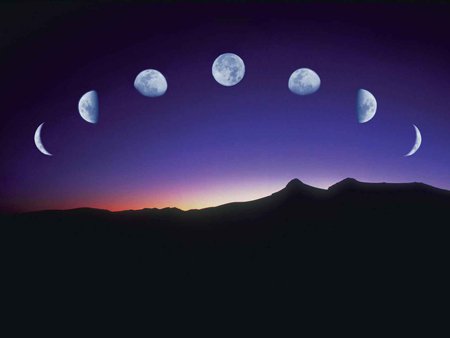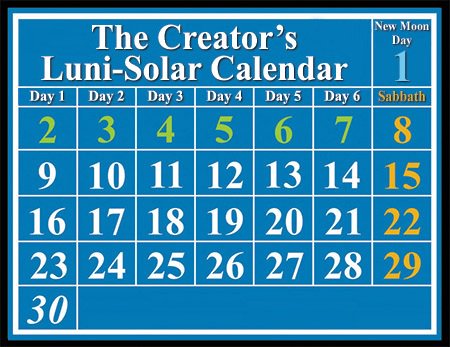
People in love do everything in their power to please the one they love. This is the natural reaction of the heart that loves. It is not viewed as a duty, but a joy and privilege! This is what the true Sabbath means to all who love their Maker and wish to honor Him. At the very start of the world, the seventh-day was set apart as a day to rest and worship the Creator. Those who value the care showered on them by a loving heavenly Father, want to obey Him and worship Him on the true Sabbath day.
The question then arises: "Which day is the Bible Sabbath? Which day is the true seventh-day Sabbath of Scripture?" There are many different, widely-held beliefs regarding when to worship. Three of these views are as follows:
While it is true that one should worship every day, the sovereign of the Universe Himself expressly commanded that on the seventh-day, labor is to be set aside and special time spent with Him. The Sabbath is not just a day of worship. It is also specifically a day of no labor. Yahuwah even stated that the Sabbath is a sign between Himself and His children forever. This article will consider the evidence for whether the true Sabbath is a "Saturday Sabbath" or what is called a "lunar Sabbath."
| "There is no excuse for anyone in taking the position that there is no more truth to be revealed, and that all our expositions of Scripture are without an error. The fact that certain doctrines have been held as truth for many years . . . is not a proof that our ideas are infallible. Age will not make error into truth, and truth can afford to be fair. No true doctrine will lose anything by close investigation." Counsels to Writers and Editors, p. 35 |
For all who want to know truth, there comes a time when the way divides. Personal prejudice, tradition and preconceived ideas should have no standing in the mind of one wanting to know "the Truth, the whole Truth and nothing but the Truth." If the seeker for truth will study with an open mind, being willing to obey what is revealed if he is convicted that it is truth, then truth will be revealed to his mind and he need not remain in error. This is what is required of all who would study the subject of the true Bible Sabbath.
Scripture reveals that the entire conflict between the Creator and Satan is contained in the battle over worship. It is a war for the mind of every man, woman and child alive today. Therefore, it would be wise for everyone on earth to examine this subject for themselves. All should study and know for sure whether the true day of worship is a Saturday Sabbath or a Lunar Sabbath.
If it is important to worship on a specific day (the Sabbath) then it is of vital importance that the correct method of counting be used to find that day. In other words, the correct calendar must be used. Time can only be measured by movement. There are three main types of calendars:
History and archeology reveal that all ancient civilizations used luni-solar calendars. While the Egyptians were the first to adopt a strictly solar calendar, their original calendar was also a lunar-solar calendar. This ancient and highly accurate method of time calculation ties lunar months to the solar year by some observable point in nature.
| The movement of the sun, moon and stars is the only accurate measurement of time. Even with modern atomic clocks, all time is measured by the cycles of the heavenly bodies. Days and years are both measured by the rotation of light as viewed from the earth. |
A solar year is 365 days long. The lunar year is 11 days shorter than the solar year. Thus, the dates of a strictly lunar calendar float through the seasons of the solar year. Various cultures that used a lunar-solar calendar, anchored the lunar months to different points in the solar year. Some, like the ancient Egyptians, used the rising of the star, Sirius, at the time of the summer solstice. Others, such as the Aztecs and the Maya, used the winter solstice for their new year. More recently, when France adopted a different calendar during the French Revolution, their year briefly began at the autumn equinox. (For further information on French and Soviet calendar reform, see Changing Weeks: Hiding Sabbath.)
Historical evidence shows that by far the majority of ancient calendars began their year in the spring, at or near the time of the spring (vernal) equinox. The Israelites also used a luni-solar calendar and began their year in the spring. Both their annual feasts and the seventh-day Sabbath were calculated by the lunar-solar calendar that had been established by the Creator at the very beginning of the world.
The Creator's calendar is a vitally important tool for finding the true seventh-day Sabbath which contains the "seal of Yahuwah": one's pledge of loyalty to the Creator. Scripture reveals that at Creation, both the sun and the moon were given to provide light as well as the means for marking the passage of time. The modern solar calendar does not use the moon for keeping time. Nor does the Hindu or the Muslim lunar calendar use the sun. Only the ancient lunar-solar calendar meets the criteria of using both the sun and the moon in its system of time-keeping.
Many people who keep the feast days listed in Leviticus 23 still observe a Saturday sabbath. They believe that the lunar-solar calendar was used only for the yearly feasts, but that Saturday of the modern solar calendar has come down in a continuous weekly cycle ever since Creation. But this is two different methods of time-keeping! Nowhere in Scripture are two separate and distinct systems of time-keeping mentioned. At Creation, one calendar was established and it required the use of both the sun and the moon.
And . . . [Yahuwah] said, Let there be lights in the firmament of the heaven to divide the day from the night; and let them be for signs, and for seasons, and for days, and years: And let them be for lights in the firmament of the heaven to give light upon the earth: and it was so. And . . . [Yahuwah] made two great lights; . . . [And He] set them in the firmament of the heaven to give light upon the earth, And to rule over the day and over the night, and to divide the light from the darkness. (Genesis 1:14-18, KJV.)
 |
|
The Creator's designated system of time-keeping uses
both the sun and the moon for tracking time.
|
Right in this passage, in the very first chapter of the first book of the Bible, the principle is established that the two great lights were to be used for marking the time for worship and as a sign, or mark of loyalty to the Creator. The word translated "signs" comes from the Hebrew word ôwth, which means a sign or mark. "This word represents something by which a person or group is characteristically marked. . . . The word means 'sign' as a reminder of one's duty." (See #226, The New Strong's Expanded Dictionary of Bible Words.)
The Sabbath is the sign by which the Creator's people are marked and set apart as different from all others on earth. The Hebrew word that is translated "seasons" is even more revealing. It is the word mo'ed. It is the use of this word that reveals the true Sabbath of Creation is reckoned by the moon. Mo'ed is the word used specifically to refer to the annual feasts.
Since the Jewish festivals occurred at regular intervals, this word becomes closely identified with them . . . Mo'ed is used in a broad sense for all religious assemblies. It was closely associated with the tabernacle itself . . . [Yahuwah] met Israel there at specific times for the purpose of revealing His will. It is a common term for the worshiping assembly of . . . [Yahuwah's] people. (See #4150, "Lexical Aids to the Old Testament," Hebrew-Greek Key Word Study Bible, KJV.)
Far from presenting two different systems of time-keeping, Scripture presents only one: the lunar-solar calendar by which the annual feasts as well as the seventh-day Sabbath, are to be calculated. Leviticus 23 is a listing of the holy feasts of Yahuwah. From the Spring Anniversaries to the Fall Feasts, Leviticus 23 delineates them all out. But the very first "feast" listed is the weekly feast: the seventh-day Sabbath.
And . . . [Yahuwah] spoke unto Moses, saying, "Speak to the children of Israel, and say to them: 'The feasts of . . . [Yahuwah], which you shall proclaim to be holy convocations, these are My feasts. Six days shall work be done, but the seventh day is a Sabbath of solemn rest, a holy convocation. You shall do no work on it; it is the Sabbath of . . . [Yahuwah] in all your dwellings." (Leviticus 23:1-3)
From there, Yahuwah went on to list the annual feasts (or mo'edim) but the very first feast He gave was the seventh-day Sabbath.
| Lunar Sabbath: A holy day of rest, it is the seventh and last day of each week in a lunation. The weekly cycle restarts with each New Moon. Four complete weeks follow New Moon Day. |
"He appointed [created] the moon for seasons." (Psalm 104:19, KJV)
The word here translated "seasons" is, again, mo'edim. The Biblical record is consistent: there is only one method of time-keeping presented in scripture. That is the lunar-solar calendar established by Yahuwah Himself at Creation. This calendar establishes all of the times appointed for worship, the mo'edim.
The first day of the month on the luni-solar calendar is New Moon Day. (For use of the term "New Moon" in Scripture, see: I Samuel 20:5, 18 & 24; 2 Kings 4:23; Psalm 81:3; Isaiah 66:23; Ezekiel 46:1; and Amos 8:5.)
 |
| On the ancient calendar, the seventh-day Sabbath always falls on the same dates of every month. |
On the Biblical lunar-solar calendar, each lunation (or lunar month) always begins with a New Moon day, which is in a class of worship day all by itself. Six work days follow on the second through seventh of the month. The seventh-day Sabbath always falls on the 8th, the 15th, the 22nd and the 29th of every lunar month.
As mentioned previously, the lunar year is shorter than the solar year and without some means of anchoring the lunar months to the solar year, the seasons would float through the calendar. The true New Year is anchored to the vernal equinox. Thus, every two to three years, an extra thirteenth month was intercalated into the year. This was called an embolismic year, because an entire additional month was added to bring the lunations back into alignment with the seasons. Ezekiel provides scriptural proof for the thirteenth month used in embolismic years. (See: Ezekiel's 13th Month.)
The lunar-solar calendar of Creation is the most accurate method of time-keeping. It is elegant, precise. It is divinely designed time-keeping. Jeremiah 31:35 refers to Yahuwah giving the "ordinances" (or laws) of the moon. The ordinances of divine time-keeping are so simple that the shepherd on the hillside can be as accurate by observation, as the astronomer in his observatory is by calculation. Even the count to Pentecost, which has long confused people because the two specifics of the count seem contradictory, can be accurately figured only by using the lunar-solar calendar.
 |
| Jewish scholars admit that the calendar they now use is not the calendar of Scripture. |
While it is true that the Jews today worship on a Saturday sabbath, this does not prove that it is the true Sabbath. They did not always worship on the Saturday sabbath. Jewish scholars are very clear that the original method of calendation was different from the modern calendar and that under intense persecution during the fourth century A.D., the Jews gave up their original lunar-solar calendar.
Declaring the new month by observation of the new moon, and the new year by the arrival of spring, can only be done by the Sanhedrin. In the time of Hillell II [4th century C.E.], the last President of the Sanhedrin, the Romans prohibited this practice. Hillel II was therefore forced to institute his fixed calendar, thus in effect giving the Sanhedrin's advance approval to the calendars of all future years. ("The Jewish Calendar and Holidays (incl. Sabbath)": The Jewish Calendar; Changing the Calendar, www.torah.org, emphasis supplied.)
The New Moon is still, and the Sabbath originally was, dependent upon the lunar cycle. (Universal Jewish Encyclopedia, p. 410)
Once the ancient lunar-solar calendar had been set aside, knowledge of the true Sabbath was lost with the acceptance of the pagan Julian calendar.
 |
| These stone fragments of an early Julian calendar clearly show an eight-day week. The Israelites did not use the Julian calendar for finding the seventh-day Sabbath. They used the original lunar-solar calendar of Creation. |
The calendar of the Roman Republic, like that of the Hebrew calendar, was also a lunar-solar calendar. In 45-46 B.C., Julius Cæsar reformed the original Roman calendar and, with the help of an Alexandrian astronomer, Sosigenes, created a new solar calendar with continuously cycling weeks: the Julian calendar. While the Julian calendar was in use at the time of the Messiah, the Israelites did not use it as the early Julian week was eight days long! The Israelites were still using their original lunar solar calendar and worshipping on the seventh day of its week.
From that time, until the fourth century, Israelites and apostolic Christians continued to use the Biblical calendar for their religious observances. With the rising power of the paganized Christians in Rome, this led to a centuries long battle over when to remember the death and resurrection of the Saviour. The Christians in Rome wished to celebrate the Messiah's resurrection on the pagan Easter. Apostolic Christians, on the other hand, wished to commemorate Yahushua's death on the original Passover.
The point of contention appeared deceptively simple: Passover versus Easter. The issues at stake, however, were immense. The only way to determine when Passover occurs is to use the Biblical luni-solar calendar . . .
Calendars calculate time and at the Council of Nicæa it was decided to set aside Jewish calculation and adopt the pagan Julian calendar. This effectively destroyed knowledge of the true Sabbath and substituted the pagan Saturday Sabbath in its place. Jewish scholars admit this fact, too.
In a colorful description of the Council of Nicæa, Jewish scholar Heinrich Graetz wrote:
At the Council of Nice [sic] the last thread was snapped which connected Christianity to its parent stock. The festival of Easter had up till now been celebrated for the most part at the same time as the Jewish Passover, and indeed upon the days calculated and fixed by the Synhedrion [Sanhedrin] in Judæa for its celebration; but in future its observance was to be rendered altogether independent of the Jewish calendar . . . . (History of the Jews, published by the Jewish Publication Society of America, 1893, Vol. II, see pp. 563-564.)
The Council of Nicæa had the most profound, far reaching effect upon the true Sabbath. To this day Catholic scholars base the authority of the Catholic Church on this act of changing the Sabbath from the true Sabbath of the lunar-solar calendar to Sunday on the continuously cycling Julian week. The pagan Julian calendar, legislated into place, an entire counterfeit system of religion. Thus the true Sabbath was buried under centuries of tradition and the assumption that the modern week has cycled continuously ever since Creation.
Isaiah 58 contains a beautiful prophecy of the work to be performed by the final generation. "And they that shall be of thee shall build the old waste places: thou shalt raise up the foundations of many generations; and thou shalt be called, The repairer of the breach, The restorer of paths to dwell in." (Isaiah 58:12)
|
The three angels' messages of Revelation 14 contain a call to worship on the true Sabbath of Scripture.
|
This is the work of those who have pledged their allegiance to the Creator by worshipping Him on His true holy day, the true Bible Sabbath. To repair the hole made in Yahuwah's law, to clear away the rubbish of error and tradition, accumulated from centuries of assumption, is the great work committed to the people of the final generation. Revelation contains a three-fold warning, calling all to "Fear . . . [Yahuwah], and give glory to him . . . and worship Him that made heaven, and earth, and the sea, and the fountains of waters." (See Revelation 14:6-10.)
This subject is of the utmost importance to all now living. The true Sabbath is the mark of loyalty that distinguishes those who are willing to obey from those who cling to tradition and assumption. All should study the subject of the lunar Sabbath, the related facts of calendar history, and pertinent passages from the Bible. The Battle of Armageddon, like everything else in the long-running war between Yahuwah and Lucifer, is fought on the battlefield of worship.
All who desire to honor their Creator will choose to worship Him on the day that He has blessed and set aside: the seventh day of the week on the lunar-solar calendar, the true lunar Sabbath.
For more on this important topic, refer to WLC's Content Directory: